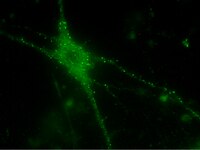17-10227 Sigma-AldrichLentiBrite™ PSD95-GFP Lentiviral Biosensor
Empfohlene Produkte
Übersicht
| Replacement Information |
|---|
Key Spec Table
| Key Applications | Detection Methods |
|---|---|
| TFX, IF, ICC, Track single cell and cell population migration (migration assay, cell culture) | Fluorescent |
| Description | |
|---|---|
| Catalogue Number | 17-10227 |
| Trade Name |
|
| Description | LentiBrite™ PSD95-GFP Lentiviral Biosensor |
| Overview | Read our application note in Nature Methods! http://www.nature.com/app_notes/nmeth/2012/121007/pdf/an8620.pdf (Click Here!) Learn more about the advantages of our LentiBrite Lentiviral Biosensors! Click Here Biosensors can be used to detect the presence/absence of a particular protein as well as the subcellular location of that protein within the live state of a cell. Fluorescent tags are often desired as a means to visualize the protein of interest within a cell by either fluorescent microscopy or time-lapse video capture. Visualizing live cells without disruption allows researchers to observe cellular conditions in real time. Lentiviral vector systems are a popular research tool used to introduce gene products into cells. Lentiviral transfection has advantages over non-viral methods such as chemical-based transfection including higher-efficiency transfection of dividing and non-dividing cells, long-term stable expression of the transgene, and low immunogenicity. EMD Millipore is introducing LentiBrite™ Lentiviral Biosensors, a new suite of pre-packaged lentiviral particles encoding important and foundational proteins of autophagy, apoptosis, and cell structure for visualization under different cell/disease states in live cell and in vitro analysis.
EMD Millipore’s LentiBrite™ PSD-95-GFP lentiviral particles provide bright fluorescence and precise localization to enable live cell analysis of PSD dynamics in neuronal cells. |
| Background Information | The postsynaptic side of an excitatory synapse contains an electron- and protein-dense region, the postsynaptic density (PSD), that positions neurotransmitters adjacent to sites of presynaptic neurotransmitter release, and also concentrates signaling molecules. MAGUKs (membrane-associated guanylate kinases) serve both as central organizers of the PSD and as signaling molecules. One such MAGUK, PSD-95, is associated with the dendritic spines of mature synapses, and is relatively immobile compared to other MAGUKs. PSD-95 fused to fluorescent proteins has been employed to quantify turnover and mobility of PSD-95. EMD Millipore’s LentiBrite™ PSD-95-GFP lentiviral particles provide bright fluorescence and precise localization to enable live cell analysis of PSD dynamics in neuronal cells. |
| References |
|---|
| Product Information | |
|---|---|
| Components |
|
| Detection method | Fluorescent |
| Quality Level | MQ100 |
| Biological Information | |
|---|---|
| Gene Symbol |
|
| Purification Method | PEG precipitation |
| UniProt Number | |
| Physicochemical Information |
|---|
| Dimensions |
|---|
| Materials Information |
|---|
| Toxicological Information |
|---|
| Safety Information according to GHS |
|---|
| Safety Information |
|---|
| Product Usage Statements | |
|---|---|
| Quality Assurance | Evaluated by transduction of HT-1080 cells and fluorescent imaging performed for assessment of transduction efficiency. |
| Usage Statement |
|
| Packaging Information | |
|---|---|
| Material Size | 1 vial (minimum of 3 x 10E8 IFU/mL) |
| Transport Information |
|---|
| Supplemental Information |
|---|
| Specifications |
|---|
| Global Trade Item Number | |
|---|---|
| Bestellnummer | GTIN |
| 17-10227 | 04053252698064 |
Documentation
LentiBrite™ PSD95-GFP Lentiviral Biosensor SDB
| Titel |
|---|








